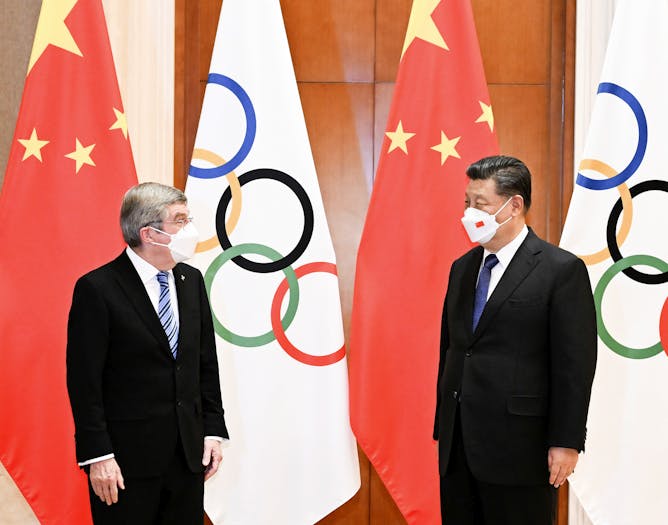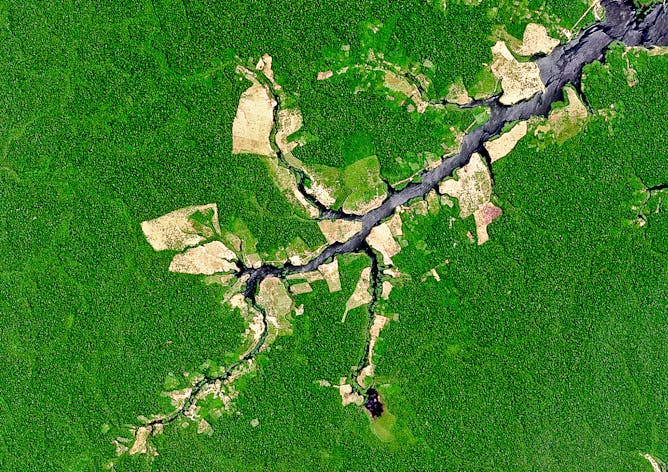|
Granite rocks are being slid across ice that’s furiously brushed. Armoured combatants with big sticks and shoulder pads are squaring up to each other. And lycra-clad daredevils are preparing to leap off hills at close to 60mph. Yes, the Olympic Winter Games are upon us.
The sport is, of course, a serious business. We’ll have explainers on the science of the events, and analysis of incredible athletic feats from our global network of academic experts. But the politics of this year’s games is at the forefront of thoughts as they open in Beijing.
Last week we launched an episode of our podcast that looks at human rights abuses in China’s Xinjiang Uyghur Autonomous Region. And that record has been a key reason behind the decision of countries such as US, UK, Canada and Australia to hold a diplomatic boycott of the games. Today, as they formally begin, we consider why they are so important to the Chinese regime. You can follow our network-wide coverage of all aspects
of Beijing 2022 here as the winter games play out this month.
|

Zhang Ling/Xinhua/AP
Yan Bennett, Princeton University; John Garrick, Charles Darwin University
The Games are a potent political symbol of the Chinese state’s ambitions and authority.
|

A satellite captured large and small deforestation patches in Amazonas State in 2015. The forest loss has escalated since then.
USGS/NASA Landsat data/Orbital Horizon/Gallo Images/Getty Images
Gabriel Cardoso Carrero, University of Florida; Cynthia S. Simmons, University of Florida; Robert T. Walker, University of Florida
Land grabs spearheaded by wealthy interests are accelerating deforestation, and Brazil’s National Congress is working to legitimize them.
|

Wachiwit/Alamy Stock Photo
Mark Brill, Birmingham City University
For the news publisher, the key word is ‘subscribers’.
|
|
|
-
Haroro J. Ingram, George Washington University; Amira Jadoon, United States Military Academy West Point; Andrew Mines, George Washington University
Abu Ibrahim al-Hashimi al-Qurayshi had led the terrorist group since 2019. His death may lead to uncertainty over who will replace him but may not signal the group’s demise.
-
Paul Griffin, The University of Queensland
Cases of the Omicron sub-variant BA.2 are now in Australia. While there’s no evidence it causes more severe disease than the original Omicron, early research suggests it’s more transmissible.
-
Theodora Dame Adjin-Tettey, Rhodes University
Many countries are experimenting with different forms of government support for journalism, but the question is about what works best and is sustainable.
-
Oyinlola Oyebode, University of Warwick; Rahul Goel, The Indian Institute of Technology Delhi
Women in cities tend to get more walking done, which is beneficial to both their health and the climate. Making streets safer for cycling would give them greater access to cities too.
-
Lynette Denny, University of Cape Town
People in the world’s poorest regions have not benefited equally from the recent advancements made in cancer screening, prevention and treatment.
-
Robert Huish, Dalhousie University
The risk to Ukraine’s democracy currently lies with the politicians who have offshore assets that can be massaged and altered from Moscow or elsewhere. Preventing this is essential.
-
Liz Giuffre, University of Technology Sydney; Siobhan McHugh, University of Sydney
Joe Rogan’s show has become a flashpoint for discussions on what should be allowed on podcasts – here’s who he is, and why he is so talked about.
-
Miles Pattenden, Australian Catholic University
Science has made a strong case for the year 536 as being one of the worst in human history, a year punctuated by volcanic eruptions, drought, famine and plague - and a year long winter.
-
John McCarthy, Flinders University
I have worked on many shipwreck investigations and have been involved in the discovery of a couple of shipwreck sites of this period. Here’s what’s usually involved in identifying a ship.
|
|

Fredj Jawadi, Université de Lille; David Bourghelle, Université de Lille; Philippe Rozin, Université de Lille
L’explosion des tarifs du gaz et des carburants risque d’accroître encore les inégalités socioéconomiques déjà exacerbées par deux années de crise sanitaire. Quelles sont les réponses possibles ?
|